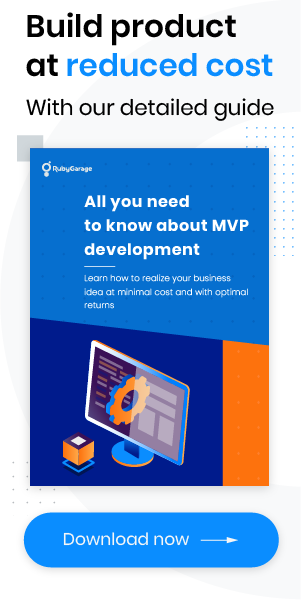-
Product Management
Software Testing
Technology Consulting
-
Multi-Vendor Marketplace
Online StoreCreate an online store with unique design and features at minimal cost using our MarketAge solutionCustom MarketplaceGet a unique, scalable, and cost-effective online marketplace with minimum time to marketTelemedicine SoftwareGet a cost-efficient, HIPAA-compliant telemedicine solution tailored to your facility's requirementsChat AppGet a customizable chat solution to connect users across multiple apps and platformsCustom Booking SystemImprove your business operations and expand to new markets with our appointment booking solutionVideo ConferencingAdjust our video conferencing solution for your business needsFor EnterpriseScale, automate, and improve business processes in your enterprise with our custom software solutionsFor StartupsTurn your startup ideas into viable, value-driven, and commercially successful software solutions -
-
- Case Studies
- Blog
How Can You Successfully Scale a Startup? Scaling vs Growing
You’ve launched your product and gotten enough traction. Now you want to widen your customer base or even go international. When it comes to expanding your business, you have two options: growing or scaling. In this article, we shed some light on the advantages and disadvantages of both approaches to help you choose the best option for your business.
Growing or scaling?
Let’s have a look at what growing and scaling are.
Growing is the process of increasing a company’s profit as the result of investment in human resources and technologies. This process is linear: first you invest, then you get more profit. Each time you want to increase your profit, you need to invest.
Imagine you have an interior design company and you want your business to grow. Growing in this case will mean having more revenue due to having more orders, and thus you’ll need to hire more designers. The more orders you get, the more designs you complete. The more designs you complete, the more revenue you have. This is a linear process that’s clear and predictable.
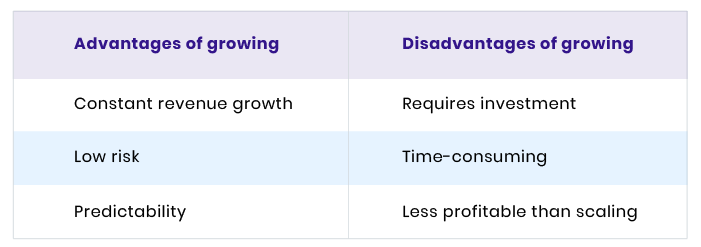
Since growing is less risky than scaling and provides more predictable results, it’s more suitable for mature businesses that aim at gradual expansion.
Scaling, on the other hand, is when a company increases its revenue without much investment. As a rule, scaling focuses on process automation to reach a wider audience. Thus, scaling is less expensive and time-consuming than growing and allows for a fast revenue increase.
Let’s get back to our interior design company. You know how to grow it, but how could you scale it? Scaling in this case would mean something like increasing revenue exponentially, for example by finding a way for your design team to complete more projects in less time. You could do that by purchasing new design software or making adjustments to your business processes. You don’t invest as much as in growing, but instead find ways to optimize your workflows and processes.
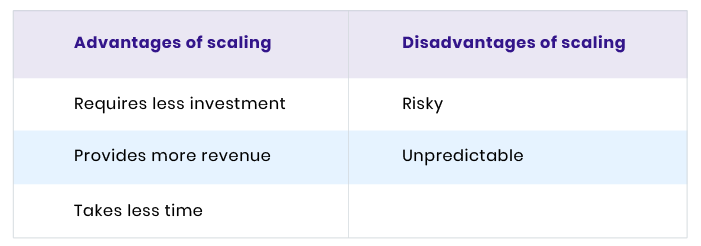
Most startups choose to scale. Scaling allows for generating more revenue without much investment, which seems more beneficial. But is it really that easy? Let’s have a closer look at what it takes to scale.
Key challenges of scaling a startup
When scaling a business, entrepreneurs face a number of challenges. We list the most common ones so you can be aware of what to expect from the process.
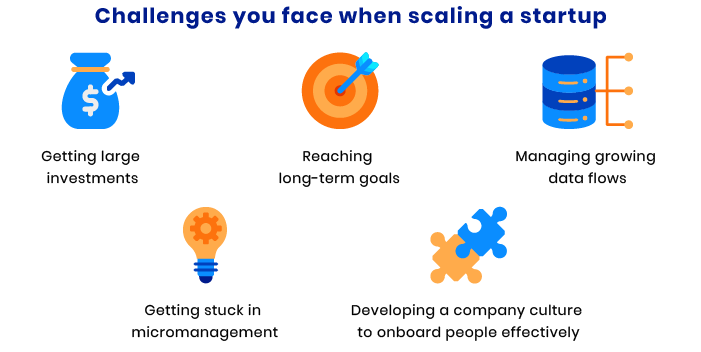
Getting large investments
Although there’s a belief that scaling your business is cheaper than growing it, you still need investment. At the scaling stage, you’re likely to look for investors to fund your business.
Investments at the scaling stage can reach up to $100 million or even more, so it’s not easy to find an investor who’s ready to provide you with the money.
Reaching long-term goals
Moving your business to a new stage without planning isn’t sensible, so planning is essential. You can start planning with setting goals. Most startups concentrate on short-term goals to better measure their progress and growth. However, it’s a mistake to neglect long-term goals, since they set the direction in which your company needs to head.
Once you know your goals, it’s time to decide how to achieve them, where to find investors, what markets to penetrate, whom to hire, and so on.
Although planning might take you months, it will become a solid basis for successful scaling.
Managing growing data flows
The bigger your business, the more data and operations you’ll need to process and manage. To do this effectively, you need to streamline and automate these processes and operations with the help of various software solutions.
There are dozens of software systems you might buy for different purposes. For example, a customer relationship management (CRM) system can help you better interact with your customers while enterprise resource planning (ERP) systems allow you to run different processes with one tool.
Without process automation inside a growing business, you’re likely to get stuck in piles of paperwork that will harm your efficiency.
Getting stuck in micromanagement
Watching every step your employees take is time-consuming and inefficient. What’s more, this tactic often has damaging consequences. First of all, it distracts you as the CEO from doing more important tasks. Second, your employees may feel uncomfortable and not trusted if you micromanage. As a result, they may become unmotivated and uninterested in doing their jobs.
Developing a company culture to onboard people effectively
Once your business starts expanding, you can hire more staff to do the work, and here the company culture is of vital importance. It’s easy to cultivate a corporate culture among 10 employees, but it’s much more difficult to do the same with 100 people.
The experience of Jeremy Ong, the owner of HUSTLR, shows how hiring people who don’t fit into your company culture influences business:
As a result, I have hired employees that do not fit into the company culture at all, which hurt company morale in ways I didn’t imagine. Employees started sharing bad habits with each other and the productivity per employee dropped because of the distractions and the poor performance of other employees. We ended up being less productive as a company, even with more people.
That said, you should be very careful when hiring new employees. It’s sometimes better to hire more slowly than to hire the wrong people.
How to scale a startup
Once you understand the obstacles you can meet during the scaleup stage, it’s time to focus on the steps you should take to expand your business successfully.
#1 Move to the next round of funding
Turning from startup to scaleup means great changes and requires you to have a clear understanding of your target audience, a viable product, an established company culture, a reliable team, and, of course, funding.
We’ve already mentioned that you’ll need tens of thousands of dollars to expand your business. The best way to get this money is to reach out to investors. To understand who to approach, you should define what sum of money you need for development. Once you know the cost of scaling, it will be easier for you to find the right people to invest in your business.
#2 Reconsider processes that don’t work anymore
There are lots of things that used to work that don’t work anymore, so you have to get rid of them. There are probably a bunch of things you’ve always done that slowed you down without you realizing it.
This quote precisely describes what Adobe discovered in 2002. For many years, an annual employee performance evaluation was compulsory at Adobe. However, it turned out that this process takes a lot of time and demotivates staff. After reconsidering the necessity of the evaluation and removing it, Adobe managers were able to spend 80,000 working hours on more effective tasks.
So what’s the conclusion? Get rid of unnecessary processes and automate those that take a lot of time to be more effective.
#3 Outsource as much as possible
Outsourcing is one of the best ways to stay effective at the scaling stage. Delegating tasks to external teams saves you time and money and allows you to concentrate on strategic tasks rather than on routine work processes.
#4 Stay agile
Scaling your business can be unpredictable. The world changes every day, and so should you. Stick to your goals, but be ready to make changes if necessary. There are several ways agility can benefit your business:
- Make your company resistant to changes. The more challenges you face during your growth, the easier it is for you to manage them over time.
- Learn from your mistakes. Once you learn to respond to a challenge differently from how you did before, you can see more ways of dealing with problems and avoid them in the future.
- Create a flexible team with strong hard and soft skills. Agility means being able to see situations at different angles and respond to them properly. By doing so, you and your team can gain valuable experience and versatility.
#5 Invest in marketing
This should go without saying, but many companies still neglect to invest in marketing. A marketing team is responsible for acquiring new customers, which is important for your growth. Thanks to marketing efforts, it’s possible to improve customer satisfaction and make customers loyal. So you definitely should pay attention to marketing when scaling your business.
#6 Learn to delegate
Doing everything on your own is never a good decision. As your team grows, learn to delegate and trust people. You can’t be an expert in every sphere of business, so let the experts you’ve hired do their jobs.
#7 Invest in culture and management
Investing isn’t just about money but is also about your efforts to create an environment that encourages business growth. Don’t tell people about your principles ‒ instead, follow these principles and people will follow your example.
#8 Keep a hiring/firing balance
This might sound strange, but yes, you should think about firing people who aren’t effective anymore. When scaling, your business moves forward. If your employees don’t move forward with you, they might slow down your company’s development.
Ask your HR managers and team leads to check how your staff copes with scaling and whether they feel comfortable working under new conditions. If they do, you have nothing to worry about. But if someone doesn’t keep up with the new pace, you should consider giving them notice.
When should you scale your startup?
Knowing when to scale is of the utmost importance for your business. A lot of startups fail because they make one common mistake ‒ they start scaling too early.
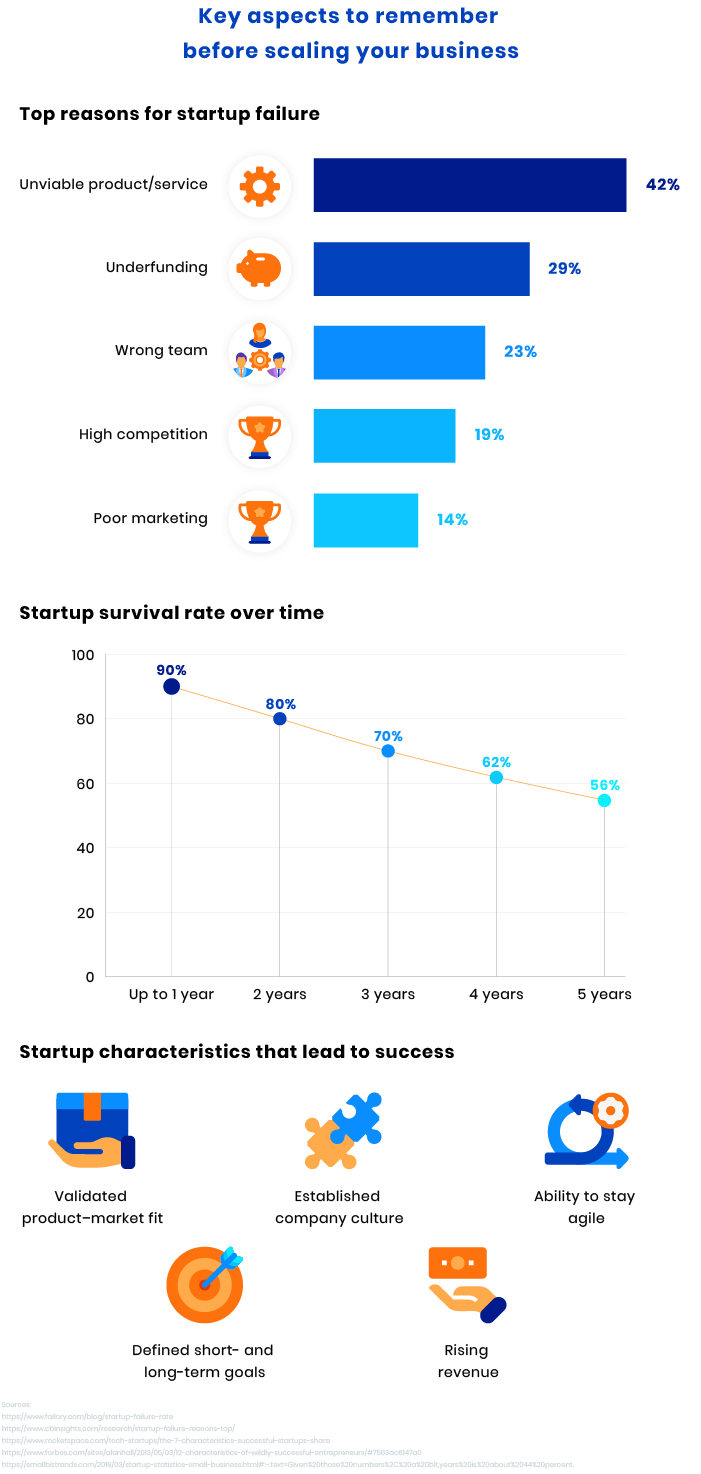
In order not to repeat others’ mistakes, consider the conditions that indicate the right time to bring your startup to a new level.
You’ve validated your product–market fit
This is the first thing you should do before scaling your business. Before considering the possibility of scaling, you should already have an MVP, a workable marketing strategy, and a well-defined target audience.
Without all these things, it’s risky to scale your business, since you won’t be sure your product will be in demand. Once you validate your product–market fit, you’ll have a good reason to justify your expansion.
You have strong customer growth
A growing flow of customers is an indicator that your product is in demand. When you know people need your product or service, you can scale your business with confidence. Moreover, there’s no need for you to expand your team if you don’t have customers to serve.
It’s important to remember that investors also want to see a stable flow of customers since it’s an indicator of rising revenue.
You have predictable revenue growth
The more money you get, the more opportunities there are for your business. Rising revenue means you have more money to expand your business and can consider scaling.
For investors, it’s important that you have predictable revenue. Investors want to be sure you have stable revenue so they won’t lose their money investing in your business. What’s more important, your business’s revenue should increase on a regular basis to prove you’re a reliable business partner.
Finally, don’t forget to control your expenses. You should know for sure how much money you spend each month/quarter/year to prevent any budget shortfalls.
You have the right team
Without the right in-house team, your business won’t work. Make sure every team member shares your company’s values and is ready to grow as your business expands.
It’s also important to choose external teams to cooperate with, since you’ll probably outsource a lot of tasks to external companies.
Final thoughts
Scaling your business can be challenging. However, it’s possible to make this process smoother and less stressful if you figure out how to automate and streamline internal processes and outsource everything that isn’t directly related to your core competencies. With the right processes, people, and plans, you’re bound to scale successfully.
FAQ
-
There are a number of challenges entrepreneurs face when scaling their businesses. Here are some of the most common:
- Getting large investments
- Reaching long-term goals
- Managing growing data flows
- Getting stuck in micromanagement
- Developing a company culture to effectively onboard people
-
To move your business from the startup to scaleup stage, you should follow these steps:
- Move to the next round of funding
- Reconsider processes that no longer work
- Outsource as much as possible
- Stay agile
- Invest in marketing
- Learn to delegate
- Invest in culture and management
- Keep a hiring/firing balance
-
It’s important not to rush when scaling your business. There are some important conditions you should meet before moving to the scaleup stage:
- Validate your product–market fit
- Achieve strong customer growth
- Secure predictable and rising revenue
- Hire the right in-house and outsourcing teams
If you’re looking for a reliable team of professionals to do some outsourcing tasks for you, contact us and let’s get to work.






